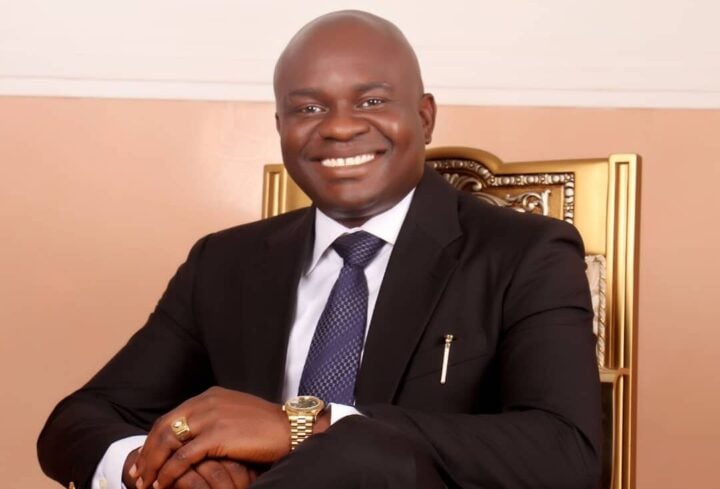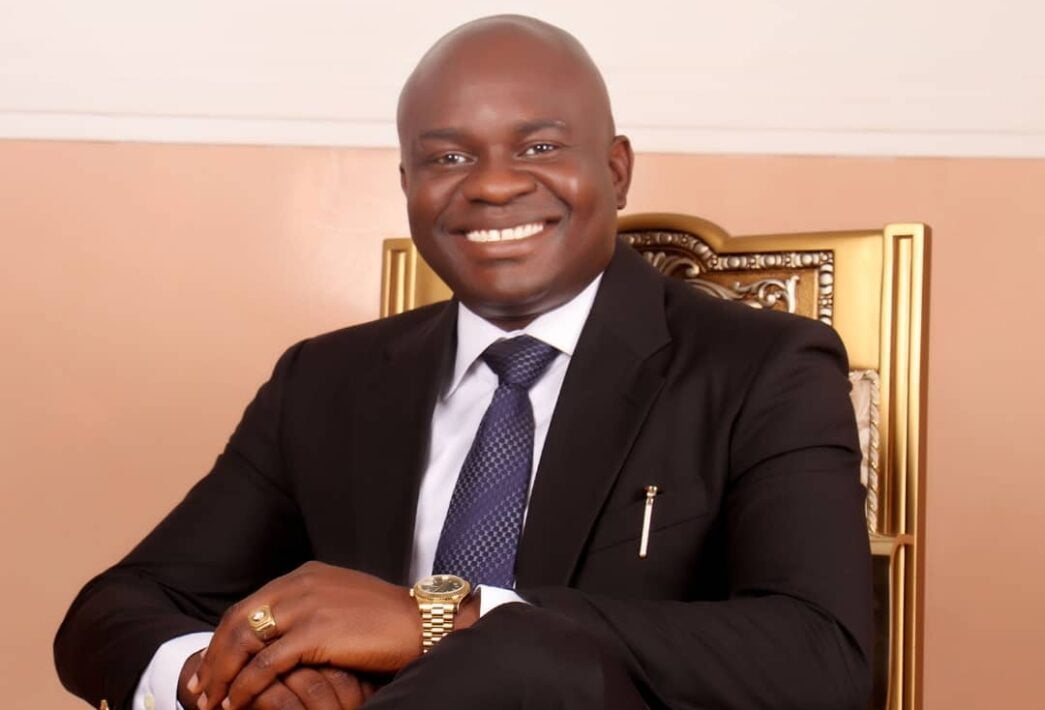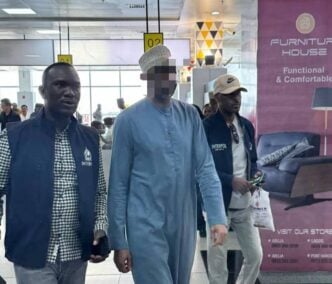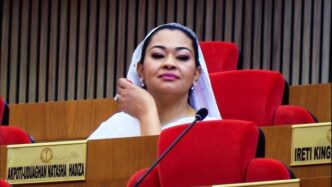Farah Dagogo is a former federal lawmaker and 2023 Rivers State governorship aspirant. He was also a state assembly member and is currently running a law programme.
In this interview with TheCable’s LEKAN IGE, he discussed the jurisprudence of his case against President Bola Tinubu and others over the emergency rule declaration and suspension of elected officials in Rivers state. He faulted Order 49 Rule 2, upon which his case was moved from Port Harcourt to Abuja, and described it as a move by the defendant to seek procedural advantage in initiating a transfer that undermines the principle of fairness.
TheCable: Do you consider the transfer of your case from the federal high court in Port Harcourt to the Abuja division as an abuse of court process?
Dagogo: Indeed, I do. The transfer constitutes a classic case of forum shopping, which the Supreme Court of Nigeria has repeatedly and unequivocally condemned. Forum shopping refers to the deliberate attempt by a litigant to move their case to a jurisdiction perceived to be more favourable, even where such a court lacks jurisdiction or is not the most appropriate venue.
Advertisement
This conduct amounts to a misuse of the judicial process and is rightly considered an abuse. Cases to that effect abound. For instance, in Dingyadi v. INEC (No. 1) (2010) 18 NWLR (Pt. 1224) 1 SC, the supreme court held, “Parties should not abandon their cases in one court only to refile it in another under the guise of a fresh suit. This undermines the integrity of the judicial process.”
Similarly, in Umeh v. INEC (2014) 8 NWLR (Pt. 1410) 593 SC, the court emphasised that legal practitioners must resist filing similar suits in different jurisdictions for the sake of strategic advantage, describing such acts as unethical and potentially sanctionable.
Furthermore, in Saraki v. Kotoye (1990) 4 NWLR (Pt. 143) 144, the apex court reiterated that instituting multiple actions involving the same parties on the same subject matter in different courts is a textbook example of abuse of court process.
Advertisement
The revered Justice Karibi-Whyte, JSC, stated, “Abuse of process may occur where two similar processes are used in respect of the exercise of the same right. Multiplicity of actions on the same matter, even where a right exists, is regarded as abuse.”
So also, in Okorodudu v. Okoromadu (1977) 3 SC 21, the court affirmed that parties must approach the correct forum vested with jurisdiction; doing otherwise undermines due process.
In essence, transferring this matter from Port Harcourt to Abuja, in the absence of legal necessity or statutory directive, is a manipulative act. It seeks to improperly influence the adjudicative process and must therefore be denounced as an abuse of court process.
TheCable: Given that the Port Harcourt and Abuja divisions of the federal high court possess concurrent jurisdiction, does this transfer promote or hinder the right to a fair hearing?
Advertisement
Dagogo: This question underscores a crucial issue in Nigerian jurisprudence: the scope and limits of jurisdictional parity among courts of concurrent jurisdiction. Although both divisions are part of the federal high court and thus possess coordinate jurisdiction, transfers between them are not automatic and must be grounded in statutory authority or permitted under procedural rules.
In National Bank of Nigeria Ltd v. Guthrie (Nigeria) Ltd (1993) 3 NWLR (Pt. 284) 643, the supreme court held: “Courts of concurrent jurisdiction are equal and coordinate; one has no supervisory or transfer power over the other.”
Similarly, in Okoro v. Nigerian Army Council (2000) 3 WLR (Pt. 647) 77, the apex court ruled that a transfer of proceedings between two federal high courts in different locations is not permissible unless specifically allowed by law.
The court reinforced this position in Adesokan v. Adegorolu (1997) 3 NWLR (Pt. 493) 261 SC, emphasising that judicial parity must be maintained, and any assumption of superiority by one coordinate court over another is erroneous and impermissible.
Advertisement
There are, of course, exceptions. Administrative or intra-divisional transfers within the same court structure, that is, between Lagos and Abuja divisions of the federal high court, may be permitted under federal high court rules, statutory instruments such as the Federal High Court Act, or at the direction of the Chief Judge.
Nevertheless, the transfer in question appears to lack clear justification grounded in statute or procedural fairness. Fair hearing, enshrined in Section 36 of the 1999 Constitution, as amended, is not merely a procedural formality; it is a foundational right. Transferring a matter in circumstances that appear designed to give one party a strategic advantage inherently undermines this right.
Advertisement
TheCable: The defendants, including the president and leaders of the national assembly, did not appear in court, yet the case was transferred at the request of the attorney-general of the federation. What is your assessment of this sequence of events?
Dagogo: This sequence raises significant concerns regarding procedural fairness and potential abuse of process. In Saraki v. Kotoye (1990) 4 NWLR (Pt. 143) 144, the supreme court emphasised that “an abuse of process occurs when a party improperly uses the judicial process to achieve an unlawful objective, including using multiple or tactical applications to frustrate proceedings”.
Advertisement
The facts here suggest precisely that the defendants, including the president and legislative leaders, failed to enter an appearance or engage with the judicial process in Port Harcourt. Yet, a request to transfer the matter, at the behest of the attorney-general, was entertained and granted.
In Mohammed v. Olawunmi (1990) 2 NWLR (Pt. 133) 458, the court reiterated that “equity aids the vigilant, not the indolent”.
Advertisement
The doctrine of clean hands is paramount in equity. A party that fails to submit to jurisdiction but subsequently seeks procedural advantage by initiating a transfer undermines the principle of fairness.
The transfer in these circumstances smacks of forum shopping and lacks the good faith required in judicial proceedings, as affirmed in Dingyadi v. INEC (No. 1) (2010) 18 NWLR (Pt. 1224) 1 SC.
TheCable: The court has relied on Order 49, Rule 2 of the federal high court (civil procedure) rules, 2019, for the transfer. Was this an appropriate legal basis?
Dagogo: Let’s start with what Order 49, Rule 2 provides: “The Court may, suo motu or upon application by any of the parties, transfer any suit pending before it to any other Judicial Division of the Court where it ought to have been commenced.”
While the rule empowers the court or the chief judge to transfer a case for reasons of territorial appropriateness or administrative efficiency, this discretion is not unfettered.
The Latin phrase “suo motu” means “on its own motion”. In judicial practice, a court may raise or act on certain issues independently, including questions of jurisdiction. However, as the supreme court clarified in Olatunbosun v. NISER Council (1988) 3 NWLR (Pt. 80) 25, even when acting suo motu, a court must hear from all parties before making a ruling to avoid infringing on the constitutional right to a fair hearing.
Furthermore, opposition to the transfer is permissible under Order 48, Motions and Applications, via a motion to vary or set aside the transfer order.
Also, Section 36 of the 1999 Constitution, on the basis that the transfer prejudices the litigant’s right to a fair hearing, judicial precedents, such as Kekong v. The State (1999) 1 NWLR (Pt. 588) 630, caution against prejudicial transfers, as well as in Adeniyi v. Governing Council, YABATECH (1993) 6 NWLR (Pt. 300) 426, which reinforces the need for participation in decisions affecting litigants.
In summary, the procedural basis cited by the court does not suffice if it results in material prejudice, lack of consultation, or an appearance of judicial bias. Such transfers are challengeable and, where found lacking in merit or fairness, can be declared null and void.
TheCable: In light of the ongoing reconciliation between Siminalayi Fubara, the suspended Rivers governor, and Nyesom Wike, his predecessor, what becomes of the suit if the suspension of elected officials is lifted and they are reinstated?
Dagogo: While political reconciliation may resolve interpersonal or administrative issues, it does not render the legal challenge moot. This suit is an action in rem, not in personam. It is brought to test the legality of the emergency proclamation under Section 305 of the 1999 Constitution and not to challenge the personal conduct or rights of any particular individual.
As I have maintained, this action seeks to interrogate the constitutionality of suspending duly elected government officials under the guise of emergency rule.
Unchecked constitutional infractions may later crystallise into harmful precedents. If this action is not judicially examined, a future president could invoke similar powers to suspend elected governments arbitrarily across the federation, thereby endangering constitutional democracy.
Therefore, the resolution of the underlying political crisis does not extinguish the jurisprudential necessity of determining whether the president’s actions were constitutional, lawful, and proportionate.











